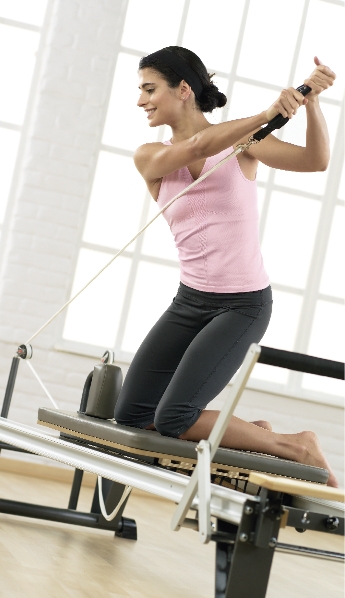
There is strong evidence that Pilates improves flexibility and dynamic balance and moderate evidence that it can enhance muscular endurance, says a research review published in the Archives of Physical Medicine and Rehabilitation (2011; 92 [12], 2071–81). Researchers from two Portuguese universities and the University of Pittsburgh School of Nursing conducted the review.
Claims made regarding benefits of the Pilates method of exercise are subject to critique because statements sometimes lack support from rigorous, well-designed, randomized, controlled studies. This study’s purpose was to evaluate whether strong scientific evidence exists that currently validates assertions made regarding the effectiveness of Pilates training for healthy people.
Sixteen studies met inclusion criteria; namely, they were published in peer-reviewed journals; were written in English; were conducted as randomized, controlled trial (RCTs) or quasi-RCTs with healthy people; had an inactive and/or exercise control group; included key study outcomes; and used Pilates as the intervention in one study arm. Analysis showed that 10 of the 16 studies were of low scientific vigor; however, six studies published within the last 5 years used high-quality research methods.
Data analysis of the study findings revealed strong evidence that Pilates improved flexibility and dynamic balance for subjects when compared with inactive individuals. Flexibility also improved among Pilates participants versus those in habitual exercise groups. Moderate evidence from one high-quality RCT showed that Pilates participants gained more muscular endurance than did inactive subjects or those engaged in habitual exercise or general postural education.
This research review provides a good basis for further analysis of high-quality studies that substantiate the benefits of Pilates exercise. Study authors recommended that future research make stronger efforts to minimize bias and report the type of Pilates, order of exercises and number of repetitions used, in order to foster reproducibility and consistency among studies.
Shirley Eichenberger-Archer, JD, MA
Shirley Archer, JD, MA, is an internationally acknowledged integrative health and mindfulness specialist, best-selling author of 16 fitness and wellness books translated into multiple languages and sold worldwide, award-winning health journalist, contributing editor to Fitness Journal, media spokesperson, and IDEA's 2008 Fitness Instructor of the Year. She's a 25-year industry veteran and former health and fitness educator at the Stanford Prevention Research Center, who has served on multiple industry committees and co-authored trade books and manuals for ACE, ACSM and YMCA of the USA. She has appeared on TV worldwide and was a featured trainer on America's Next Top Model.





